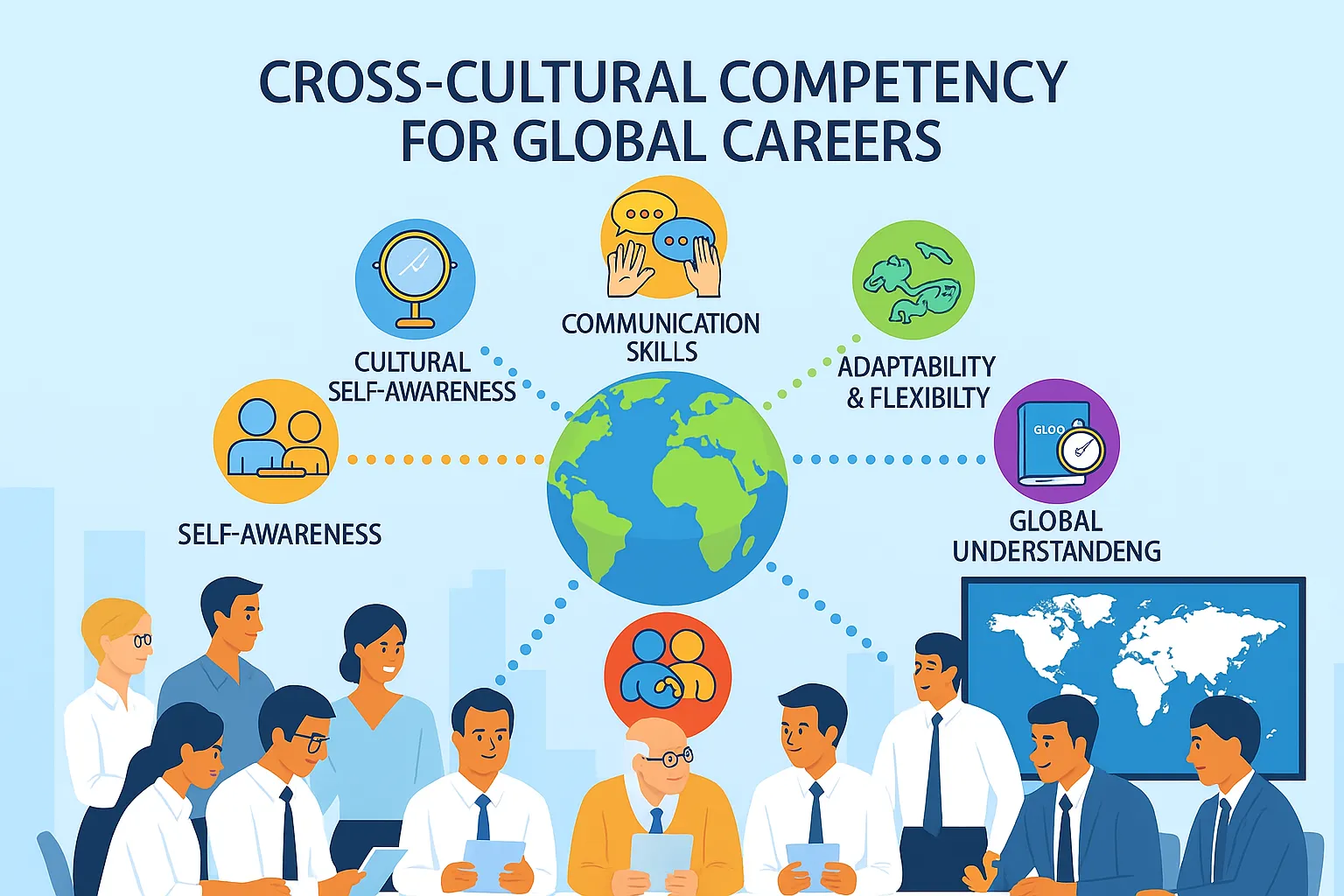Table of Contents
- Introduction: The New Reality of Global Careers
- What is Cross-Cultural Competency?
- Why Cultural Intelligence Drives Global Careers
- Core Elements of Cross-Cultural Competency
- Building Your Intercultural Skills Toolkit
- Cross-Cultural Competency Across Career Fields
- Measuring and Enhancing Intercultural Skills
- The Future of Cross-Cultural Competency in Careers
- FAQs
- Conclusion
Introduction: The New Reality of Global Careers
In 2025, cross-cultural competency is essential for thriving in global careers. Leading virtual meetings with colleagues from Tokyo, London, São Paulo, and Mumbai requires navigating diverse perspectives shaped by culture. This skill defines career success in our interconnected world. This guide provides strategies to excel in multicultural environments, build professional relationships, and stand out in the global job market. Culturally diverse teams are 70% more likely to capture new markets, and professionals with intercultural skills earn 25% more. Explore related skills in AI Careers, AI vs Machine Learning Careers, and Best Countries for Higher Education.

What is Cross-Cultural Competency?
Cross-cultural competency enables professionals to work effectively with diverse cultural backgrounds, fostering productive global careers. It involves understanding cultural differences, adapting communication, and building relationships in multicultural settings, making it a cornerstone for international career success.
Why Cultural Intelligence Drives Global Careers
Why Employers Value Intercultural Skills
Employers prioritize cross-cultural competency, with 67% of global assignment success tied to these skills. Key reasons include:
- Globalization: Businesses operate across continents, needing culturally adept employees.
- Remote Work: Distributed teams rely on workplace diversity skills for collaboration.
- Innovation: Cross-cultural competency drives creativity in diverse teams.
Learn more about global skills in Study Abroad Opportunities.
Core Elements of Cross-Cultural Competency
Cultural Awareness and Sensitivity
Building cross-cultural competency starts with recognizing your biases and understanding differences in:
- Communication styles
- Time management and deadlines
- Decision-making processes
- Work-life balance perspectives
Effective Communication for Intercultural Skills
Adapt communication to enhance global career success:
- Verbal: Adjust pace, volume, and directness to cultural norms.
- Written: Tailor email tone and formality to regional expectations.
Adaptability and Flexibility
Thrive in multicultural workplaces by:
- Adjusting work styles to cultural approaches
- Embracing feedback and diverse perspectives
- Adapting problem-solving to cultural contexts
Building Your Intercultural Skills Toolkit
Practical Strategies for Cross-Cultural Competency
- Language Learning: Learn basic phrases to show respect and enhance cross-cultural competency.
- Cultural Research: Study history and business practices of relevant cultures.
- Active Listening: Detect cultural nuances in communication.
- Empathy Building: Understand diverse perspectives to strengthen intercultural skills.
Leveraging Technology for Cultural Intelligence
Use digital tools to boost global professional skills:
- Online cultural training programs
- Virtual reality cultural immersion
- Cross-cultural mentorship platforms
- International collaboration tools
Explore tech-driven learning in AI and ML Careers.
Cross-Cultural Competency Across Career Fields
International Business and Trade
Navigate cultural protocols and negotiation styles to excel in global careers.
Healthcare and Social Services
Apply intercultural skills to understand cultural perceptions of illness and treatment.
Technology and Remote Work
Master virtual cross-cultural collaboration for tech-driven global careers. See AI Career Skills.
Education and Training
Adapt teaching methods to diverse learning styles to enhance cross-cultural competency.
Measuring and Enhancing Intercultural Skills
Self-Assessment Tools for Cross-Cultural Competency
Evaluate your progress in:
- Comfort in diverse cultural situations
- Adapting communication styles
- Building cross-cultural relationships
- Resolving culturally-influenced conflicts
Seeking Feedback for Improvement
Gain insights from diverse colleagues to enhance intercultural skills.
The Future of Cross-Cultural Competency in Careers
As AI and automation reshape jobs, cross-cultural competency remains a vital human skill for global careers, positioning professionals for leadership in multinational organizations. Visit World Economic Forum for trends.
FAQs
How long does it take to develop cross-cultural competency?
Basic awareness takes weeks, but deep competency develops over months or years with practice.
Can cross-cultural competency be learned online?
Online resources provide foundational knowledge, but real-world practice enhances learning.
Which industries value cross-cultural competency most?
International business, healthcare, education, technology, and hospitality highly value intercultural skills.
How do I demonstrate cross-cultural competency on my resume?
Highlight international projects, multicultural leadership, and language skills with measurable results.
Is cultural competency different from cultural sensitivity?
Cultural sensitivity is awareness, while competency includes actionable skills for effective cross-cultural work.
How can remote workers develop cross-cultural competency?
Join virtual international teams, attend webinars, and seek mentorship from global professionals.
Conclusion
Mastering cross-cultural competency unlocks unparalleled opportunities in global careers. By honing intercultural skills, professionals bridge cultural divides, drive innovation, and thrive in the 2025 global marketplace.
